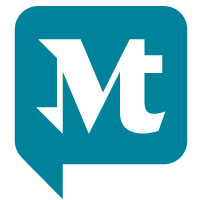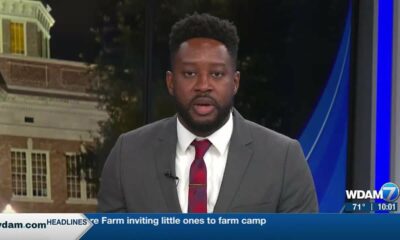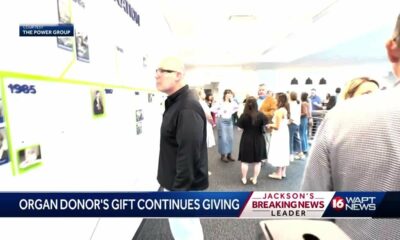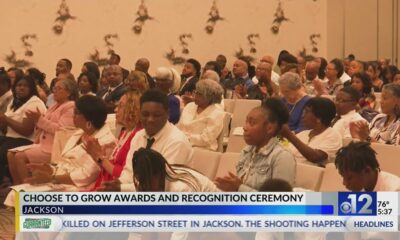Mississippi Today
In the wake of deadly tornadoes, schools react to power outages and building damage

In the wake of deadly tornadoes, schools react to power outages and building damage
Four school districts are closed Monday as a result of the deadly tornadoes that made their way across the state over the weekend and killed 21 people, according to the Mississippi Emergency Management Agency.
The districts are:
- South Delta School District
- Amory School District
- Carroll County School District
- Winona-Montgomery Consolidated School District
Brian Jones, superintendent of the Amory School District, described the situation as “very, very overwhelming.” He said schools will be closed all week in the district and the goal is to have students back by next Monday. Amory High School was the only school building to sustain damage in one part of the campus, allowing it to be used for instruction once schools reopen.
Jones said the district's school buses had all the windows blown out by the storm, which they are working to repair, adding that they have been in communication with other districts about borrowing school buses. He also said the athletic facilities are gone and students will not be playing any sports for the remainder of the year while the district works to rebuild.
“The community has rallied around itself with everybody trying to help everybody,” Jones said.
No buildings were damaged in the Winona-Montgomery Consolidated School District, according to Superintendent Teresa Jackson, but the district and much of the surrounding community are currently without power.
Jackson said the estimate from Entergy was that power would be restored by 10 p.m. Tuesday night, but said she considers this optimistic. She added she is concerned about food access since the one grocery store in Winona is running on generators and most other stores are without power.
“We want to get our schools open as soon as possible so that we can serve breakfast and lunch, have mental health resources, and just get back into a routine,” Jackson said. “Kids need routine.”
Jackson said they hope to be back in school before the end of the week. She also expressed her appreciation for the fellow superintendents, state leaders, and local companies who have checked on them and offered assistance.
“When there are tragic events like this, the state of Mississippi really wraps their arms around those people,” she said. “That is why I love Mississippi so much, because we take care of each other, we care about each other, and we're going to reach out and say ‘How can we help?'”
A spokesperson for the Mississippi Department of Education said it has been in continued contact with all affected districts, and is working with federal, state and local agencies to administer support services. State Superintendent Robert Taylor visited the communities most severely affected on Monday.
The Mississippi Emergency Management Agency said the New Albany School District and Humphreys County School District, also in the path of the tornadoes, were operational on Monday, which the New Albany Superintendent Lance Evans confirmed to Mississippi Today. Evans added that the damage to facilities in his district was extremely minimal compared to other districts.
Superintendents of the South Delta School District and the Carroll County School District could not be reached for comment. According to the Mississippi Department of Education, school buildings in South Delta sustained roof damage but are not destroyed and Carroll County school buildings were undamaged but are currently without power.
Hank Bounds, the former state superintendent of education during Hurricane Katrina, said for the most severely affected districts, reopening schools is secondary to ensuring their students and staff are safe and cared for. Bounds said he has offered his assistance through state leaders to districts trying to figure out their disaster recovery plans, but has not been in contact with any yet.
“My guess is they are doing nothing but thinking about the welfare of their people right now, as they should be,” he said.
No colleges or universities in the state appear to have sustained damages.
On Saturday evening, Mississippi Valley State University in Leflore County posted a message from its president, Jerryl Briggs, on social media. The campus “avoided a severe blow,” Briggs wrote, but the families of students, faculty and staff were affected. To support those community members, the university was organizing a community service event.
“Our hearts ached as we watched the news coverage and have since heard of the reports of those who lost their lives, property, and so much more,” Briggs wrote.
Molly Minta contributed to this report.
This article first appeared on Mississippi Today and is republished here under a Creative Commons license.
Mississippi Today
On this day in 1951


April 28, 1951

Ruby Hurley opened the first permanent office of the NAACP in the South.
Her introduction to civil rights activism began when she helped organize Marian Anderson's 1939 concert at the Lincoln Memorial. Four years later, she became national youth secretary for the NAACP. In 1951, she opened the organization's office in Birmingham to grow memberships in Alabama, Florida, Georgia, Mississippi and Tennessee.
When she arrived in Mississippi, there were only 800 NAACP members. After the governor made remarks she disagreed with, she wrote a letter to the editor that was published in a Mississippi newspaper. After that step in courage, membership grew to 4,000.
“They were surprised and glad to find someone to challenge the governor,” she told the Chicago Defender. “No Negro had ever challenged the governor before.”
She helped Medgar Evers investigate the 1955 murder of Emmett Till and other violence against Black Americans. Despite threats, she pushed on.
“When you're in the middle of these situations, there's no room for fear,” she said. “If you have fear in your heart or mind, you can't do a good job.”
After an all-white jury acquitted Till's killers, she appeared on the front cover of Jet magazine with the headline, “Most Militant Negro Woman in the South.”
Months later, she helped Autherine Lucy become the first Black student at the University of Alabama.
For her work, she received many threats, including a bombing attempt on her home. She opened an NAACP office in Atlanta, where she served as a mentor for civil rights leader Vernon Jordan, with whom she worked extensively and who went on to serve as an adviser to President Bill Clinton.
After learning of Evers' assassination in 1963, she became overwhelmed with sorrow. “I cried for three hours,” she said. “I shall always remember that pool of blood in which he lay and that spattered blood over the car where he tried to drag himself into the house.”
She died two years after retiring from the NAACP in 1978, and the U.S. Post Office recognized her work in the Civil Rights Pioneers stamp series. In 2022, she was portrayed in the ABC miniseries, “Women of the Movement.”
This article first appeared on Mississippi Today and is republished here under a Creative Commons license.
Mississippi Today
Rare open negotiations occur on important Medicaid expansion issue
The curtain was pulled back last week for the first time in years on the Mississippi Legislature's often mysterious conferencing process.
A conference committee consists of three representatives and three senators appointed to try to reach agreement when the two chambers pass differing versions of the same bill. Last week, a conference committee formed to try to reach agreement on Medicaid expansion caused a stir by meeting in a public setting.
Even though the joint rules of the Mississippi Legislature call for an open conferencing process, the conferees seldom meet in public. They usually meet and negotiate their differences near the end of the session behind closed doors.
That was not always the case.
For a period in the late 1990s and early 2000s, the Legislature, under intense pressure from the Mississippi Press Association, made open conference committees the norm.
Some major issues have been played out in public conference committees. Notable open conferences include:
- The infamous, excruciatingly long special session in 2002 where businesses received more protection from lawsuits.
- Budget fights when Haley Barbour was governor when legislators often would reach an impasse in the negotiations process and spend the bulk of their time talking about their cars and eating candy.
- The major rewrite of the state's economic development package under then-Gov. Ronnie Musgrove called Advantage Mississippi.
- The Mississippi Adequate Education Program, which for decades has provided the state's share for the basic operation of local school districts. It was hammered out in an open conference process in 1997 even before the joint rules mandated the open process.
Then-state Sen. Musgrove and former House Speaker Billy McCoy deserve credit or blame, according to one's perspective, for proving the open conference process could work. When they chaired their respective chamber's education committees, they insisted on having an open conference process.
But in more recent years, open conference committees have been few and far between. The joint rule has been largely ignored.
The fact that the three House and three Senate conferees agreed to meet at least once in public on Medicaid expansion — one of the most pivotal issues facing the Legislature in recent years — drew considerable attention.
If nothing else, the open conference committee provided a raw and unedited view of how far apart the two chambers were at the time on an issue that would provide additional health care coverage to primarily the working poor.
The House wanted to provide coverage to those earning up to 138% of the federal poverty level, or about $20,000 annually for an individual, while the Senate had proposed providing coverage to those earning less than 100% of the federal poverty level, or about $15,000 per year.
According to various experts, the House plan would provide coverage to many more working Mississippians and cost less to the state than would the Senate plan. The reason for the lower cost to the state is that when expanding to 138%, the federal government will pay 90% of the costs and provide the state an additional roughly $700 million over two years as an enticement to expand.
Under the Senate plan, the federal government will pay 77% of the cost and offer no incentives. It is important to understand that in the expensive world of health care, the difference in 77% of the cost and 90% means tens of millions to Mississippi state coffers.
The House conferees repeatedly pointed out those numbers — their plan covering more at less cost — during last week's open conference committee.
One of the reasons legislators through the years have not been enamored with an open conference process is that it has often turned into efforts by the negotiators to sell their position to the public.
Once the open conference process starts, the side that feels the most comfortable with its position wants to meet more often in full view of the public to make sure the public understands where each side stands.
For whatever it is worth, the House conferees were more enthusiastic about continuing the open process after the initial Medicaid expansion conference committee.
And after that initial open conference, the Senate offered a compromise to cover those earning up to 138% of the federal poverty level — just as the House proposed.
This article first appeared on Mississippi Today and is republished here under a Creative Commons license.
Mississippi Today
Legislation to strip key power of PERS Board passes both chambers
Legislation that strips significant power from the board that governs the state's public employee pension program has passed both chambers of the Legislature.
Under the legislation set to go to Gov. Tate Reeves during the final days of the 2024 session, the Public Employees Retirement System Board would no longer have the authority to increase the contribution rate levied on governments (both on the state and local level) to help pay for the massive retirement system.
The legislation, which passed both chambers in recent days, was a reaction to the decision by the board to increase by 5% over a three-year period the amount local governments contribute to each employee's paycheck for their retirement. Under the PERS Board plan, the employer contribution rate would have been increased to 22.4% over three years, starting with a 2% increase on July 1.
The board said the increase was needed to ensure the long-term financial stability of the system that pays retirement benefits for most public employees on the state and local levels, including staff of local school districts and universities and community colleges.
City and county government officials in particular argued that the 5% increase would force them to cut government services and lay off employees.
Under the bill passed by the Legislature there still would be a 2.5% increase over five years — a .5% increase in the employer contribution rate each year for five years.
In addition, legislative leaders said they plan to put another $100 million or more in state tax dollars into the retirement system in the coming days during the appropriations process.
Under current law, the PERS Board can act unilaterally to increase the amount of money governmental entities must contribute to the system. But under the new bill that passed both chambers, the board can only make a recommendation to the Legislature on increasing the employer contribution rate.
The PERS Board also would be required to include an analysis by its actuary and independent actuaries on the reason the increase was needed and the impact the increase would have on governmental entities.
In the 52-member Senate, 14 Democrats voted against the bill. Only one House member voted against the proposal.
Sen. David Blount, D-Jackson, said the bill failed to address the financial issues facing the system. He said a permanent funding stream is needed.
Blount said, “You are moving in the wrong direction and weakening the system” with the bill the Legislature approved. “Is it painful? Is it going to cost more money? Yes, but we need to do it” to fix the system.
The system has assets of about $32 billion, but debt of about $25 billion. But Sen. Daniel Sparks, R-Belmont, and others argued that the debt was “a snapshot” that could be reduced by strong performance from the stock market. The system depends on its investments and contributions from employers and employees as sources of revenue.
The system has about 360,000 members including current public employees and former employees and retirees.
The legislation states that no changes would be made for current members of the system. The legislation does reference looking at possibly changing the system for new employees. But that would be debated in future legislative sessions.
The bill does not include an earlier House proposal to dissolve the PERS Board, which consists primarily of people elected by the members of the system, and replace them with political appointees.
This article first appeared on Mississippi Today and is republished here under a Creative Commons license.
-
Local News4 days ago
Sister of Mississippi man who died after police pulled him from car rejects lawsuit settlement
-
Mississippi Today4 days ago
At Lake High School in Scott County, the Un-Team will never be forgotten
-
Mississippi Today16 hours ago
On this day in 1951
-
Mississippi News2 days ago
One injured in Mississippi officer-involved shooting after chase
-
Mississippi News6 days ago
Cicadas expected to takeover north Mississippi counties soon
-
Mississippi News5 days ago
Viewers make allegations against Hatley teacher, school district releases statement – Home – WCBI TV
-
Mississippi News Video4 days ago
Vehicle struck and killed man lying in the road, Alcorn County sheriff says
-
Mississippi Today7 days ago
On this day in 1892



































